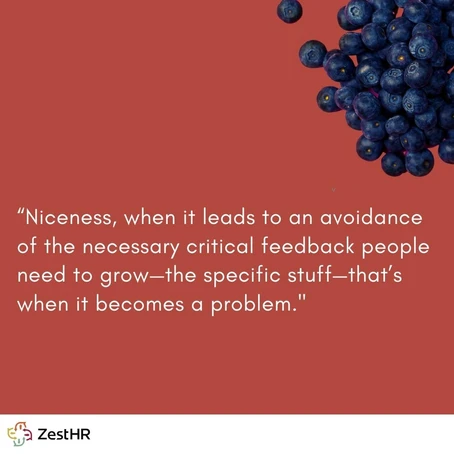In the world of work, kindness and niceness are virtues that are often celebrated and encouraged. However, is there such a thing as being “too nice” in the workplace? Can an excess of niceness actually hinder growth and progress?
The Pitfall of Excessive Niceness
“Niceness, when it leads to an avoidance of the necessary critical feedback people need to grow—the specific stuff—that’s when it becomes a problem.” This insight from a
Fortune.com article sheds light on the potential downside of being overly nice in the workplace. While being kind and considerate is undoubtedly important, avoiding critical feedback can hinder individual and organisational growth.
When employees are shielded from constructive criticism or are hesitant to provide it to their peers, several issues can arise. One of the most significant consequences is the amplification of uncertainty and burnout. Employees may never truly know where they stand in terms of performance, career progression, or job security. This lack of clarity can lead to anxiety and stress, affecting overall job satisfaction.
Moreover, the absence of candid feedback can impede professional development. Constructive criticism is essential for individuals to identify areas for improvement and refine their skills. Without it, employees may remain stagnant in their roles, hindering their potential growth and contributions to the organisation.
Additionally, when an environment of excessive niceness prevails, employees may not feel a sense of psychological safety. Psychological safety is the belief that individuals can speak up, make mistakes, or ask questions without fear of negative consequences. In such an environment, innovation, creativity, and open communication may suffer, ultimately hampering progress.
The Value of Constructive Feedback
Developing a culture of healthy feedback is the antidote to the pitfalls of excessive niceness. Encouraging open and honest communication allows employees to provide and receive constructive criticism without fear of retribution. Here are some of the benefits:
- Increased Employee Engagement: Employees who feel heard and valued are more engaged and committed to their work. When they receive feedback that helps them grow, they are more likely to be motivated and invested in their roles.
- Improved Performance: Constructive feedback provides individuals with actionable insights for improvement. As they address areas of weakness, they can enhance their performance, contributing to the organisation’s success.
- Reduced Turnover: A culture that fosters healthy feedback reduces frustration and dissatisfaction among employees. This, in turn, lowers turnover rates, as employees are more likely to stay in an environment where their concerns are addressed, and they have opportunities to grow.
Engaging ZestHR in Cultivating a Feedback Culture
What could it look like to engage ZestHR to manage a culture project within your business? Our experienced team specialises in developing and nurturing a culture of healthy feedback. Here’s how we can help:
- Culture Audit: We start by assessing your current workplace culture, identifying areas where feedback processes can be improved.
- Culture Strategy: We work with you to develop a tailored culture strategy that aligns with your organisation’s goals and values.
- Culture Change Initiatives: We implement targeted initiatives to encourage open communication, feedback exchange, and a growth mindset among your employees.
- Leadership Coaching: Our experts provide coaching and guidance to leaders to promote a culture of healthy feedback within their teams.
- Ongoing Monitoring: We continuously monitor the progress of culture change initiatives to ensure their effectiveness and make adjustments as needed.
While niceness is a valuable trait, we believe kindness and compassion are essential to providing balanced and constructive feedback in the workplace. Encouraging open and honest communication can lead to increased employee engagement, improved performance, and reduced turnover. If you’re interested in cultivating a feedback culture within your organisation, ZestHR is here to help.

